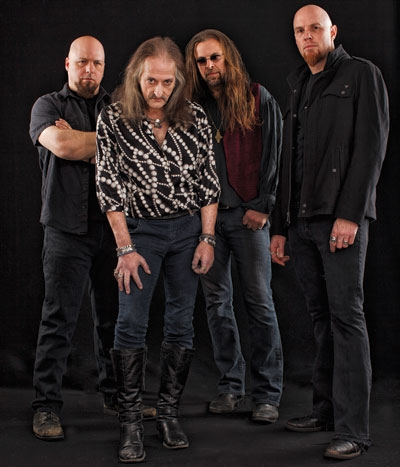Pentagram
ft. Electric Citizen & Satan’s Satyrs
The Pyramid Scheme, Grand Rapids
Oct. 10, 7 p.m.
$20 advance, all-ages
pyramidschemebar.com, (616) 272-3758
In the ’80s and ’90s, music videos were breaking bands large, the tail wildly wagging the dog.
Flash forward to 2011, when Last Days Here, a 91-minute video that would be available to anyone with a Netflix account, turned Pentagram, a band that had toiled in obscurity since the ’70s, into a cultish phenomenon.
The documentary had little to do with music but instead with the twisted, crack-addled ramblings of Bobby Liebling, Pentagram vocalist and a classic coulda/shoulda star since he started in 1971.
He speaks through sometimes cocaine-frozen lips as he tries to explain his life in the movie. The cruel irony is that it took that tortured existence to get Pentagram on the map.
“When that came out, it won awards and became fairly mainstream and increased the attention to us,” noted guitarist Victor Griffin, who has been in and out of the band since the 80s. Even though the documentary is mostly about Liebling, he said “it’s only been since then that we can say we are making a living on Pentagram.”
For his part, Griffin, a metal journeyman whose sounds and skills merit Iommi-like worship, has done four different tours of duty with Pentagram, including this tour to support the latest, Curious Volume, which makes fellow stoner rockers look like pikers.
It always comes back to Liebling, the mercurial vocalist whom he first met in the early ’80s, when he was trying to put a band together after moving from his native Tennessee to Virginia. They called it doom rock but to most folks it was Black Sabbath.
“We were looking for a singer and no one was doing this doom stuff,” Griffin said. But someone knew Liebling, a guy who lived in an apartment with his mom and dad. “He comes with a lot of baggage,” was the warning.
But when Griffin heard the voice, “that’s the guy,” he said.
“He’s this little guy and he talks with a small voice, but when he sings, it just comes out loud.”
Failed demos, conversations with industry honchos including Blue Oyster Cult managers Sandy Pearlman and Murray Krugman, first and second chances, excuses, and other screw-ups resulted in a band with a great sound and amazing songs to go under the radar for four decades.
Griffin has cranked a life in the trenches of the music industry with some fleeting success. But his identity is tied inextricably to Pentagram and the five studio albums he’s been part of that are invariably solid.
The story up to the documentary is a pretty basic tale of talent gone to waste and the timid world of corporate rock and roll.
Since beginning in 1971, Pentagram, with a number of names, has used 37 members. That includes exploding drummers. Liebling is the lone constant.
“I really didn’t think [the documentary] would help that much,” Griffin said. “Over the past 35 years we’ve dealt with so many high hopes and people saying they want to help us, and they would do this and that.”
He insists that the music, which is background stuff in the movie, merits the attention.
“Behind all the drama and the shock of seeing Bobby in that condition, if there wasn’t substance in the music, that movie would only take us so far.”
Instead, it has given them the distribution and sales that they have forever chased.
“We were both dying to get out on the road when we were in our 20s and 30s,” Griffin said. He’s now 53 and Liebling is 61. “We thought by now we would be past the age of doing that.”





